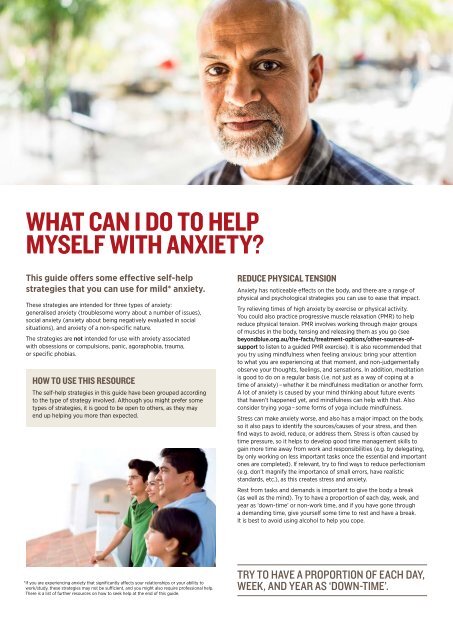WHAT CAN I DO TO HELP MYSELF WITH ANXIETY?
OWCwQRQq
OWCwQRQq
Create successful ePaper yourself
Turn your PDF publications into a flip-book with our unique Google optimized e-Paper software.
<strong>WHAT</strong> <strong>CAN</strong> I <strong>DO</strong> <strong>TO</strong> <strong>HELP</strong><br />
<strong>MYSELF</strong> <strong>WITH</strong> <strong>ANXIETY</strong>?<br />
This guide offers some effective self-help<br />
strategies that you can use for mild* anxiety.<br />
These strategies are intended for three types of anxiety:<br />
generalised anxiety (troublesome worry about a number of issues),<br />
social anxiety (anxiety about being negatively evaluated in social<br />
situations), and anxiety of a non-specific nature.<br />
The strategies are not intended for use with anxiety associated<br />
with obsessions or compulsions, panic, agoraphobia, trauma,<br />
or specific phobias.<br />
HOW <strong>TO</strong> USE THIS RESOURCE<br />
The self-help strategies in this guide have been grouped according<br />
to the type of strategy involved. Although you might prefer some<br />
types of strategies, it is good to be open to others, as they may<br />
end up helping you more than expected.<br />
REDUCE PHYSICAL TENSION<br />
Anxiety has noticeable effects on the body, and there are a range of<br />
physical and psychological strategies you can use to ease that impact.<br />
Try relieving times of high anxiety by exercise or physical activity.<br />
You could also practice progressive muscle relaxation (PMR) to help<br />
reduce physical tension. PMR involves working through major groups<br />
of muscles in the body, tensing and releasing them as you go (see<br />
beyondblue.org.au/the-facts/treatment-options/other-sources-ofsupport<br />
to listen to a guided PMR exercise). It is also recommended that<br />
you try using mindfulness when feeling anxious: bring your attention<br />
to what you are experiencing at that moment, and non-judgementally<br />
observe your thoughts, feelings, and sensations. In addition, meditation<br />
is good to do on a regular basis (i.e. not just as a way of coping at a<br />
time of anxiety) – whether it be mindfulness meditation or another form.<br />
A lot of anxiety is caused by your mind thinking about future events<br />
that haven’t happened yet, and mindfulness can help with that. Also<br />
consider trying yoga – some forms of yoga include mindfulness.<br />
Stress can make anxiety worse, and also has a major impact on the body,<br />
so it also pays to identify the sources/causes of your stress, and then<br />
find ways to avoid, reduce, or address them. Stress is often caused by<br />
time pressure, so it helps to develop good time management skills to<br />
gain more time away from work and responsibilities (e.g. by delegating,<br />
by only working on less important tasks once the essential and important<br />
ones are completed). If relevant, try to find ways to reduce perfectionism<br />
(e.g. don’t magnify the importance of small errors, have realistic<br />
standards, etc.), as this creates stress and anxiety.<br />
Rest from tasks and demands is important to give the body a break<br />
(as well as the mind). Try to have a proportion of each day, week, and<br />
year as ‘down-time’ or non-work time, and if you have gone through<br />
a demanding time, give yourself some time to rest and have a break.<br />
It is best to avoid using alcohol to help you cope.<br />
*If you are experiencing anxiety that significantly affects your relationships or your ability to<br />
work/study, these strategies may not be sufficient, and you might also require professional help.<br />
There is a list of further resources on how to seek help at the end of this guide.<br />
TRY <strong>TO</strong> HAVE A PROPORTION OF EACH DAY,<br />
WEEK, AND YEAR AS ‘<strong>DO</strong>WN-TIME’.


